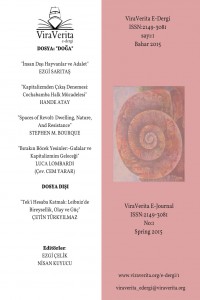Abstract
Geç dönem Heidegger, kendi düşünsel yaşamını değerlendirirken, insanın ikamet ederken esasen evde olmayı istediğini anlayarak mesken tutma kavramını değiştirmiştir. Mesken tutma kavramını anlamak, bizim doğa ve direniş ile ilişkimiz açısından oldukça önemlidir. İnsanlar çevrelerinde nasıl evde olabilirler? Bir özne nasıl mesken tutabilir? Gitgide artan bilimsel ve teknolojik bir rasyonalitenin tahakkümü ile kuşatılmış olan insanı incelerken bu sorular kesin olarak zorlaşır. Eğer geç dönem Heidegger eve dönmek için kaygıdan geçmeyi insanın arayışı olarak ele almakta haklıysa, biz kendi tahakkümcü kültürel pratiklerimizin üstesinden nasıl gelebiliriz ve özneyi bunların inotantikliğine mecbur bırakan teknolojik rasyonelliğe ve çerçeveleme ağlarına tam olarak direnecek bölgeler nasıl bulabiliriz? Direniş “eve dönüş”te başlar. Bir insan kendini evinde bulduktan sonra, insanların ‘otantikliğine’ aldırmaksızın kültürün ve bilimsel-teknolojik insan rasyonalitesinin tahakkümcü pratiklerine bir şekilde direnmelidir. Başkaldırı uzamı denecek olana giriş veya ona dönüş, fiziksel uzamların, baskıcı, engelleyici, kapitalist uzama direnebilme yollarını aydınlatacak ve bireye uzamsal başkaldırı formlarını sunacaktır (şüphesiz etik, şahsi, komünal gibi diğer formları da). Böylelikle zihni, düşüncedeki dönüşlülüğü ve insanın varoluşuyla, doğayla ve dünyayla daha temel bir ilişkiyi zenginleştirecektir
Keywords
References
- Adorno, T.W. (1973). Negative Dialectics. London: Routledge.
- Bachelard, G. (1994). The Poetics Of Space. Boston: Beacon Pr.
- Capobianco, R. and Richardson W.J. (2010), Engaging Heidegger. Toronto: University of Toronto Press.
- Foucault, M. (1994). The Birth of the Clinic: An Archaeology of Medical Perception. New York: Vintage.
- Foucault, M. (1995). Discipline and Punish: The Birth of the Prison. New York: Vintage.
- Foucault, M. (1990). The History of Sexuality: An Introduction. New York: Vintage.
- Foucault, M. (1986)."Of Other Spaces." Diacritics. 16.1: p. 22-27.
- Fromm, E. (2005). To Have or to Be? New York: Continuum.
- Fromm, E. (2006). The Art of Loving. New York: Harper Perennial.
- Heidegger, M. (2010). Being And Time. State University of New York Press.
- Heidegger, M. (2003). Four Seminars. Bloomington, IN: Indiana UP.
- Heidegger, M. (1971). Poetry, Language, Thought. New York: Harper & Row.
Abstract
The later Heidegger, reflecting on his life of thinking, changed his concept of dwelling to find fundamentally that a human being wants to be at home in dwelling. Understanding the concept of dwelling is fundamental to our relationship with nature and resistance. How is it that human beings are to be at home in their surroundings? How can a subject dwell? These questions become explicitly difficult when examining a human being located in the midst of the ever-increasing dominance of scientific and technological rationality. If the late Heidegger is correct in assuming that it is the human being’s quest to pass through anxiety in order to return home, then how are we to break through our dominating cultural practices and find sites that truly resist technological rationality and the networks of enframing that pin a subject down to their inauthenticity? Resistance begins in the “return to home”. After finding oneself at home, regardless of the human beings’ ‘authenticity,’ one must have in some way resisted the dominating practices of culture and human scientific-technological rationality. The enter into or return to a, what will be called, space of revolt, illuminates ways physical spaces can resist domineering, obstructive, capitalist space and present the individual with forms of spatial revolt (and doubtless other forms as well such as ethical, personal, communal, etc.), thus enriching mind, reflexivity in thought, and a more fundamental connection with human existence, nature, and the world.
Keywords
References
- Adorno, T.W. (1973). Negative Dialectics. London: Routledge.
- Bachelard, G. (1994). The Poetics Of Space. Boston: Beacon Pr.
- Capobianco, R. and Richardson W.J. (2010), Engaging Heidegger. Toronto: University of Toronto Press.
- Foucault, M. (1994). The Birth of the Clinic: An Archaeology of Medical Perception. New York: Vintage.
- Foucault, M. (1995). Discipline and Punish: The Birth of the Prison. New York: Vintage.
- Foucault, M. (1990). The History of Sexuality: An Introduction. New York: Vintage.
- Foucault, M. (1986)."Of Other Spaces." Diacritics. 16.1: p. 22-27.
- Fromm, E. (2005). To Have or to Be? New York: Continuum.
- Fromm, E. (2006). The Art of Loving. New York: Harper Perennial.
- Heidegger, M. (2010). Being And Time. State University of New York Press.
- Heidegger, M. (2003). Four Seminars. Bloomington, IN: Indiana UP.
- Heidegger, M. (1971). Poetry, Language, Thought. New York: Harper & Row.
Details
| Primary Language | English |
|---|---|
| Other ID | JA35MJ65ZA |
| Journal Section | Articles |
| Authors | |
| Publication Date | July 13, 2016 |
| Submission Date | July 13, 2016 |
| Published in Issue | Year 2015 Issue: 1 |
ViraVerita E-Journal is licensed under a Creative Commons Attribution-NonCommercial 4.0 International License (CC BY-NC).

